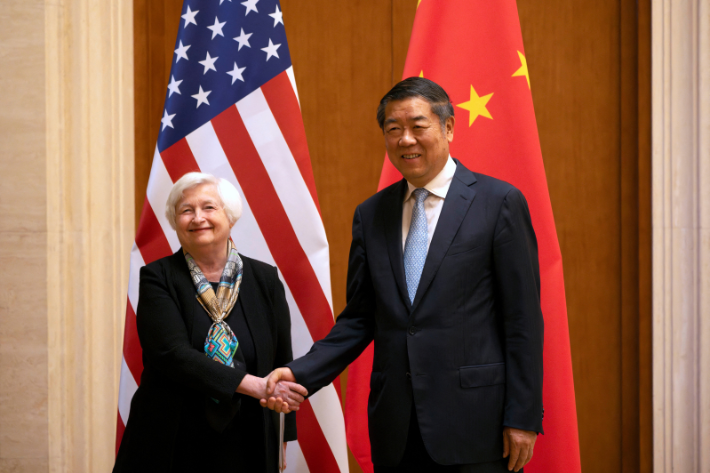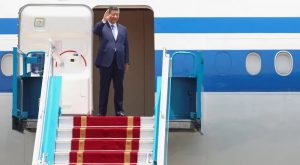China’s recently appointed economic czar He Lifeng met US treasury secretary Janet Yellen on Saturday and said he regretted “unexpected incidents” that derailed ties between Washington and Beijing, following Yellen’s call for greater communication between the world’s two biggest economies.
“Unfortunately, due to some unexpected incidents such as that involving the airship, there were some problems in the implementation of the consensus reached by the two heads of state,” He was quoted as saying by the Agence France-Presse.
He was referring to the alleged Chinese spy balloon found flying over US airspace earlier this year. The balloon, eventually shot down by the US military, worsened already troubled ties between the countries and prompted diplomat Antony Blinken to scrap a planned trip to Beijing.
Also on AF: Yellen Urges Reforms, Hits at China’s ‘Unfair’ Actions on US Firms
Vice premier He and Yellen met on Saturday for talks that lasted for about five hours, followed by a dinner.
Chinese state media described their meeting as “in-depth, candid and pragmatic”.
While the talks were “constructive”, the Chinese side expressed concern about US sanctions and restrictive measures against China, state-run Xinhua news agency said.
China also believes that generalising the concept of national security does no good for normal economic and trade exchanges, Xinhua reported.
Yellen doubles down on US sanctions
In the meeting, Yellen urged closer communication between China and the United States to improve economic decision-making.
Record high US-Chinese trade last year, despite bilateral tensions, showed there was “ample room” to engage in trade and investment, Yellen told He at the start of the meeting.
Two-way trade between the US and China hit $690 billion last year amid talk an economic decoupling, which both countries oppose.
“The United States and China should seek a relationship of healthy economic competition that is not winner-take-all, but that, with a fair set of rules, would benefit both countries over time,” she said.
“Where we have concerns about specific economic practices, we should and will communicate them directly.”
Yellen added that the United States will continue to take targeted actions to protect its national security.
But she urged China to not allow disagreements to “lead to misunderstandings.”
‘Pressing need’
Yellen’s visit through Sunday is Washington’s latest attempt to repair ties with Beijing, battered over issues from Taiwan to technology.
Washington’s chip export controls and Beijing’s retaliatory clampdown on key chipmaking metals gallium and germanium — announced just before Yellen landed in Beijing — have muddled trade ties between the two and threaten to disrupt global supply chains.
Both sides have downplayed expectations for breakthroughs from official visits, while hailing the opportunity for candid, face-to-face diplomacy.
“Amid a complicated global economic outlook, there is a pressing need for the two largest economies to closely communicate and exchange views on our responses to various challenges,” Yellen told He.
Doing so could “help both sides more fully understand the global economic outlook and make better decisions to strengthen our economies”, she said.
Meeting Yellen at the Diaoyutai state guest house where foreign dignitaries are often received, He said he stood ready to work with Yellen.
‘Meet China halfway’
Yellen told a group of female economists on Saturday that she was “in Beijing at this critical time because, for all the disagreements between our nations, President Biden and I believe it is in the best interests of our peoples to put our relationship on a better track and to maintain open and honest lines of communication”.
“I strongly believe that the relationship between our two countries is rooted in the solid ties between the American and Chinese people. It is important that we keep nurturing and deepening these ties, especially as China reopens after three years of Covid lockdowns.”
Beijing, meanwhile, has repeatedly told Washington to match words with action, pointing to continued US moves to curb Chinese access to technologies including semiconductors.
Beijing has also refused to resume bilateral military ties, while tariffs imposed on Chinese products during a trade war under Biden’s predecessor, Donald Trump, remain intact.
On Friday, however, recently appointed Premier Li Qiang left the door open to further dialogue, urging Yellen to “meet China halfway” as both sides inject “positive energy” into bilateral ties.
Climate finance ‘critical’
Yellen told government officials and climate experts on Saturday that China had the capacity to help the world tackle the “existential threat” of climate change.
Beijing and Washington must take the lead in helping poor nations meet their climate goals and cope with the impact of climate change, she told a roundtable.
Cooperation on climate finance was a “critical” responsibility of “the world’s two largest emitters of greenhouse gases and the largest investors in renewable energy”, she said.
China, classified as a developing country by the United Nations, has long said it was the responsibility of developed nations to help poor countries pay to address climate change.
But Beijing says it could contribute to “loss and damage” due to climate change on a voluntary basis.
- Reuters, with additional inputs from Vishakha Saxena
Also read:
Curbs on Chipmaking Metals ‘Just The Beginning’, China Warns
China’s New Anti-Espionage Law Puts Firms at Risk, US Warns
US to Cut China Access to Amazon, Microsoft Cloud Computing: WSJ
China Curbs Mean Permanent Loss of Opportunities for US, Nvidia Says
US to Target Investment in China Chips, AI, Quantum Computing
China Raids Office of US Due Diligence Firm, Detains Staff
Pentagon Says Chinese Spy Balloon Drew a Blank – Guardian
























